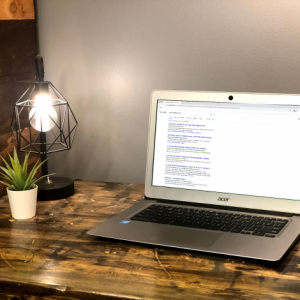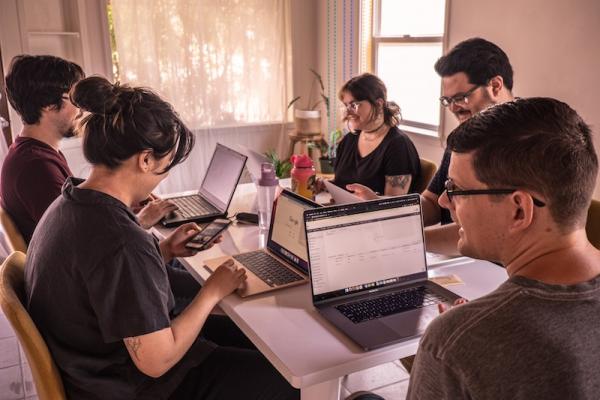What is SEO?
SEO, also known as Search Engine Optimization, is the process of optimizing a website so that the site appears higher in search engine results. Every small business should consider SEO to grow their business. SEO is a very useful tool for boosting your content’s organic traffic and getting long term results. Organic traffic means visitors discover your website through a Google search, without paid advertisement. Paid ads are a good supplement once a steady stream of organic traffic has been established. You can read more about ad types in our marketing resources.
SEO requires long-term commitment to get results, once you begin you’ll need to manage and keep it going. If you own or are responsible for managing and promoting content on a website, optimizing content will benefit your traffic. Considering SEO during content creation or hiring a content strategist is a great start but it’s more than throwing a few keywords on each page and calling it a day. Let’s start by breaking down search engines.

The goal for SEO is to drive organic traffic to your site by telling search engines that your content is a good resource for users who need that information. By choosing the right keywords and including them in written content, you determine what that traffic looks like. For example, say your business sells bicycles. The main keyword that should be the main focus of your content is “bicycles.” But you can also optimize that and think further, including words like “bike”, “bike tires”, “bike repair”, etc. Optimizing will lead to longer, widespread results compared to running ads, which stop giving you results as soon as the ad ends. When you have good organic traffic and continue to grow it, then paid ads are a good supplement to your SEO efforts.
One good way to garner a lot of keywords and get more relevant content on your website is by starting a blog.

The goal for SEO is to drive organic traffic to your site by telling search engines that your content is a good resource for users who need that information. By choosing the right keywords and including them in written content, you determine what that traffic looks like. For example, say your business sells bicycles. The main keyword that should be the main focus of your content is “bicycles.” But you can also optimize that and think further, including words like “bike”, “bike tires”, “bike repair”, etc. Optimizing will lead to longer, widespread results compared to running ads, which stop giving you results as soon as the ad ends. When you have good organic traffic and continue to grow it, then paid ads are a good supplement to your SEO efforts.
One good way to garner a lot of keywords and get more relevant content on your website is by starting a blog.

Linking improves your ranking by adding credibility once you’ve got everything in place. Adding links tells search engines that you are a credible source for the topic of the content. An inbound link sends traffic to other sites and is extremely valuable. Search engines treat inbound links like votes for importance and popularity for content like we treat word of mouth business recommendations. If you were to ask three people for the best bakery and all three recommended XYZ Bakery, you are likely to go there. If you have a piece of content that three other sources are linking to, the search engines are more likely to prioritize your original page. Internal links point users to related pages on your website. If you have multiple pieces of content that link to a common page it tells search engines the common page is of high importance.
Linking out to other sites in your content won’t help your SEO directly but it does build dependability with your users which can result in more traffic and better SEO in the end.
More on the Basics of SEO and common questions we get about it on our blog.

Now that we’ve covered the basics, there’s the matter of onsite and offsite SEO. Most of the SEO optimization you’ll do will be for your website, which is considered “onsite.” Onsite SEO looks like creating original, compelling content that is updated regularly and contains the right balance of H1/H2/H3 headings to get the search engine’s attention. In this original content, you should include images with descriptive text as well. The title and description of your website are other elements of the website you will want to be sure to optimize. To make it easy for search engines to find and index you, make the title no more than 60 characters and the description no more than 150 characters. These character limits are the search engine’s preference, as it gives them enough information about what you do.
As for offsite SEO, let’s go back to those links we discussed earlier. Getting your website linked on other websites is “offsite” SEO. At first, it may seem like there’s not much you can do for this other than cold calling or emailing other businesses to ask for a link. But there are a few ways to increase the external sites linking to your content, such as collaborating with a peer in your industry and having them write a guest post. They will likely mention and link to you on their blog, which makes it mutually beneficial. To monitor inbound linking, you can use a tool like Moz’s Link Explorer and see how many websites have linked to you already. Our CEO wrote a blog post that discusses the difference between onsite and offsite SEO, with more tips for optimizing both, to help you get a better understanding of what you can do to better your SEO. When you have fully optimized your website then you can start to grow your business through SEO.

With proper SEO practices, you will help the right people find you on the internet while growing your business. Growth happens through targeting visitors that need your services and hold traits similar to your ideal customer. Targeting visitors increases the likelihood that people will find your content helpful, rather than trying to appeal to a larger pool of people that aren’t looking for what your content offers. The more you get the right people to your content, the lower your bounce rate should be because they’ve found what they need. Reduce bounce rate through good content with information visitors actually need, which builds credibility with search engines when they see visitors spending more time on your website.
Our post How SEO Grows a Business has more information from our marketing specialist about long-term SEO efforts. On the other end of things, what if your website is actually harming your SEO?

There’s so much you can do to improve your SEO, as we’ve discussed so far! When evaluating your current content and SEO efforts it’s good to keep an eye out for things that could actually be harming your SEO. Content that’s incomplete or poorly written, including too many keywords in place of substantial content, and copied content can all negatively impact SEO. Another element that often gets overlooked is a disorganized sitemap. Keeping your content well organized makes it easier for search engines to crawl and index your website.
We suggest checking out our blog post on how your website could be damaging your SEO efforts; we’ve discussed the elements above in more detail and included poor practices like link buying.
Do you need an SEO audit? Contact 95Visual today to set up an SEO audit and call to discuss your SEO needs!

Other Resources
Here are a few other resources that we have written on .
